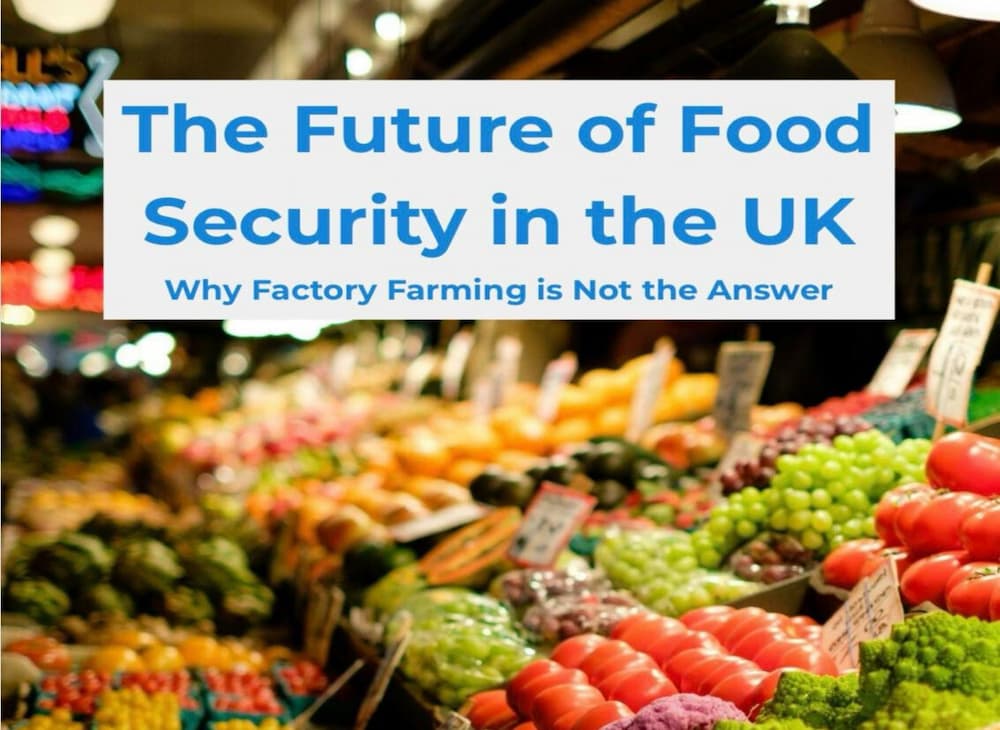CAWF have completed a landmark research report: ‘The Future of Food Security in the UK: Why Factory Farming Is Not the Answer’.
National press coverage can be found here: Daily Express
The CAWF report challenges the narrative that factory farming bolsters UK food security, revealing instead how it undermines it—costing taxpayers millions, threatening farmers’ livelihoods, and increasing our reliance on imports. With food security a hot topic (nine parliamentary debates in 2024 alone and mentions in every major party’s manifesto), our findings offer a fresh, evidence-based angle Our review of the evidence suggests that conversely, the factory farming of chickens and pigs undermines UK food security. Instead, the key to boosting UK food security is to focus policy on cheaper British-farmed fruits and vegetables, as well as alternative proteins
Conservative Animal Welfare Foundation Patron Sir Roger Gale MP commented:
“This new report on the future of food security in the UK reveals how factory farming undermines food security and argues for more investment and policy focus on the UK’s horticulture sector, build upon British farmed fruit, vegetables, and alternative proteins to provide a healthy and nutritious diet for everyone in our country. It is imperative that we implement urgent and comprehensive reforms to address the clear and undeniable failures within our current food system. Such reforms are essential not only to rectify the issues at hand but also to facilitate a meaningful transition towards more sustainable farming practices”.
A self-sufficient UK food system
- Factory-farmed animals are dependent on imported soy for feed, reducing UK self-sufficiency. Taking imported soy feed into account, the UK is only 41% self-sufficient in pork, 54% in chicken and 57% in overall meat – far lower than Defra’s official estimate of 85%.
- Despite this, the real crisis deserving policy attention is the UK’s low self-sufficiency in fruit and vegetable production.
- Reducing factory-farmed meat consumption by 20% and reallocating the land to crop inputs for alternative proteins could increase UK meat self-sufficiency by 35 percentage points, greatly reducing the need for food imports.
An affordable, healthy diet for everyone
- Experts agree that the UK overconsumes meat, so further reducing the price of factory-farmed meat does nothing for nutrition security.
- Fruits and vegetables are the backbone of nutrition security, yet affordability remains a major barrier.
- Alternative proteins are healthier than the meat they replace, but similarly, affordability is a key bottleneck to widespread adoption.
A fair, robust farming sector
- Factory farming breeds and amplifies animal diseases such as Bird Flu and African Swine Fever. Animal disease devastates farmers’ livelihoods and destabilises the food system, causing sharp fluctuations in food prices and costing taxpayers millions in culls.
- Factory farming concentrates excessive power in a handful of large, profit-driven meat corporations, who obstruct food security reform for their own gain.
- Alternative proteins could create thousands of rewarding jobs for UK farmers.
- Factory-farmed meat contributes towards climate change, which drives the extreme weather that ruins UK crop farmers’ yields
- Factory farming pollutes our countryside, jeopardising long-term food security and costing taxpayers millions.
- A 20% swap from factory-farmed meat to alternative proteins could reduce the environmental damage from factory farming by £32M a year.
The previous government recognised the importance of the fruit and vegetable sector in May 2024: https://www.gov.uk/government/publications/a-blueprint-to-grow-the-uk-fruit-and-vegetable-sector/a-blueprint-to-grow-the-uk-fruit-and-vegetable-sector
Lorraine Platt, Co-Founder of the Conservative Animal Welfare Foundation, issued a stark warning:
“Our report exposes the urgent need to overhaul the current food system. Industrial factory farms are a failing model—harming not only our small farmers but also threatening food security. We must halt the construction and expansion of new pig and chicken factory farms immediately. Far from bolstering our food security, these massive industrial livestock operations burden taxpayers and deepen our dependence on imports. The Government announced in December 2024 that it will develop a new “ambitious” National Food Strategy. As our report has argued, a food strategy that maximises UK food security should trade factory farms for fruits, vegetables and alternative proteins. The Government must act now, investing significantly in UK horticulture with grants for glasshouses, automation, and farm adaptation grants to help those wanting to transition away from factory farming to alternative forms of farming. The time for action is now.”
December 2024 saw the announcement by Steve Reed MP, Secretary of State for Environment, Food and Rural Affairs, that the UK government will develop a new “ambitious” National Food Strategy. As our report has argued, a food strategy that maximises UK food security should trade factory farms for fruits, vegetables and alternative proteins to offer access to affordable, healthy and nutritious food for everyone in our country.
Our report flags up the pressing need for transformative changes to the current food system and how industrial factory farms represent a failing model that is not only letting down our small farmers but also inflicting significant harm to food security. Key recommendations include not allowing building or expansion of new pig and chicken factory farms, rather than improving our food security, large-scale industrial livestock production facilities cost government and taxpayers money and increasing our reliance on food imports. It’s important that there is considerable investment in building the UK horticulture sector and this should include infrastructure and technology grants for glasshouses and automation and farm adaption grants for those wanting to transition from factory farming to alternative forms of farming.
The report has received national press coverage in the print and online version of The Daily Express.

The Report can be found here

